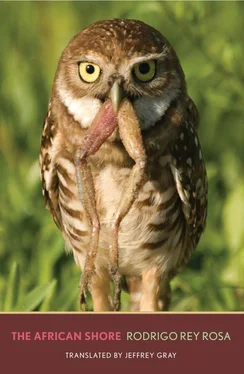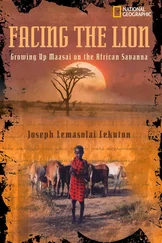Now the Muslim seemed agitated.
“You have to go!” he shouted.
“Why?” He opened the elevator door.
“The boss told me to tell you. That’s all.”
“Really? Where is your boss?”
“He’s not here. But the bird cannot stay.”
“All right,” he said, stepping into the elevator. “I’ll go.”
The car started to rise. Abdelkhay, who kept on looking at him through the grille, shouted, “Bad bird! Bad bird!” before his face disappeared under the elevator floor.
The bed was unmade; they had taken the sheets and pillowcases. The Berber rug had disappeared, and the curtains on the glass door were open wide. Three or four pigeons walked on the balcony railing. He closed the glass door and went to the bathroom, where he found the owl perched on the edge of the tub. It opened its beak and unfurled its wings. “Yes, get out of here, there’s too much light in this room.” It flew close by him, expertly, into the bedroom and landed on the dressing table. It looked at itself in the mirror. Then it turned its head around and looked at him, still standing beside the door. “We’re going to move, girl. The trouble is I don’t know where yet.” He went back to the bathroom to wash his hands.
“Fuck!” he yelled. They had taken all the towels.
Drying his hands on his pants and in his hair, he went back to the bedroom and sat on the bed. He looked at the telephone. He ought to tell the consulate he was moving out of the hotel.
The honorary consul acted as if he were used to situations like this.
“An owl — I see. That’s interesting. Come in, come in. Leave it there. That’s fine. And what are you doing with an owl?”
He left his bag behind the parlor door and set the cage on a Moroccan chest. Someone shouted something in Arabic in another apartment and a door closed.
“That’s Morad,” explained the consul, “my friend from Rabat. Won’t you sit down? What happened at the Atlas?”
“It messed all over the place.”
“They are certainly right, the hotel people. This is not a bird they’re going to like, no sir,” he said, rolling his eyes. “And what do you plan to do?”
“Look for another hotel, to start with. I’ll let the bird go, naturally. But it seems a bit young. And I think it’s weak.”
The consul gazed at him. He was not interested in the owl but in him.
“What can I do for you?”
“Can I leave my things here while I look for another room?”
“Where will you look?”
“I’m thinking of a pension in the Medina. I don’t think they’ll object.”
The consul’s face changed. The idea of staying in a pension in the Medina was unthinkable.
“If you can live in places like that. . But then you can, of course, you’re young.” He paused. “Listen,” he said, “you wouldn’t be selling drugs, would you?”
“No. Of course not.”
“Fine. Anyway, you can be frank with me.”
“I guess I’d better be going. You don’t know how grateful I am.” He stood up and leaned over the cage, looking at the owl. “Goodbye, precious,” he said. “You’ll be safe here.”
“Precious, eh?” the consul repeated mockingly. “You’re as crazy as everyone else in this blessed country.”
The consul walked with him to the stairs, which descended directly to the street door. Before closing it behind him, he heard the consul saying:
“Morad! Come see what our new Colombian friend brought us.”
The sun was blazing high in the magnificent Moroccan sky, but down among the dim and narrow streets it was damp and cold. He walked quickly through a sloping labyrinth, where now and again he could smell the sea. In the wider parts, vendors stood pressed against the walls, selling crockery, natural cosmetics, vegetables, and fish. Finally he came to the Zoco Chico, where, in the Café Tingis, Rashid sat at a little table with two other men, filling out football betting cards. He sat down a few feet away.
“Hercules, Toledo. .” one of the men recited, while the others said “1,” “x,” or “2.”
“Numancia, Compostela. . Mallorca, Atlético de Madrid. .”
When they were finished, Rashid excused himself and came to sit with him.
“What’s new, my friend? I don’t have your kif yet.”
“I didn’t come for that. I’m looking for a pension.”
“You want to live in a pension? Around here?”
“Why not?”
“No. . nothing.” Rashid looked at his hands for a moment. “I know two or three. If you want, I’ll take you.”
“The problem is that I have an owl.”
“Ah, yes, an owl?” He smiled. “You have an owl?” He seemed amused.
“I’m told that people around here don’t like them. In Colombia a lot of people think they bring bad luck.”
“Why? There are stupid people everywhere. It’s just a bird. I don’t believe in that foolishness. Good luck or bad luck — I’m a good Muslim; I can’t believe in nonsense.”
“You’ll help me find a pension?”
“Yes, of course. Yal-lah. ”
They got up.
They headed down the old Rue de la Poste, where they met a poor young woman dressed in a ragged military uniform. Rashid explained that her husband had been captured by the Algerians, or by the Polisario, when he was serving in the army. She thought he was still alive, and had been saving money for over ten years to travel south to look for him, Rashid said.
“Here it is.”
“Pension Calpe,” said the sign painted in red ink on an iron door. The tiled hallway smelled of dirty feet and lye, and the walls were covered in grime. A fat Moroccan, dressed in a frayed djellaba and plastic slippers, showed them a room on the second floor. It was larger than he had expected. The semidarkness was convenient; only one small window, which looked onto a narrow inner patio, let in the daylight. A naked bulb hung from the ceiling. Though the bed was very narrow, the sheets looked clean.
“Will it do?” asked Rashid.
“Yes, it’s fine.”
“Pay him.”
“What?”
“If you want the room, you pay the man now.”
“All right,” he said. “I’ll be back this afternoon.”
They went out to the street.
“Now,” said Rashid, “you can buy me a coffee.”
He followed Rashid uphill along a little street that smelled of sewage and dead bodies. They were going to a little smokers’ café, Rashid said, where they could find a kif cutter.
“The other day, I was talking to two kids who make money catching dogs,” Rashid said. “They use them to fool the dogs at the Spanish customs. They sell them to a truck driver who smuggles hashish in his truck. He cuts a dog’s throat and sprinkles its blood where the shit is stashed. They say that as soon as the police dogs catch a whiff of the blood, they back off; the smell scares them.”
“Incredible.”
“How could I make up something like that?”
“And it works?”
“I guess. What do I know?”
They came to the café, a dark cubicle with four little tables along a wall grotesquely painted with a desert scene — dunes, a camel, and palm trees. The tea maker, an old man with a turban and vest, greeted Rashid and gave the newcomer a look of indifference or distrust.
They sat down on a straw mattress with their backs against the wall. The old man served them tea and then eased himself down onto a small wooden platform covered with a rattan mat beside another Moroccan, a young man with long hair and large dirty yellow teeth who was busy cutting kif on a wooden plank. The smell of the herb mixed pleasantly with that of mint and orange blossom.
Читать дальше












